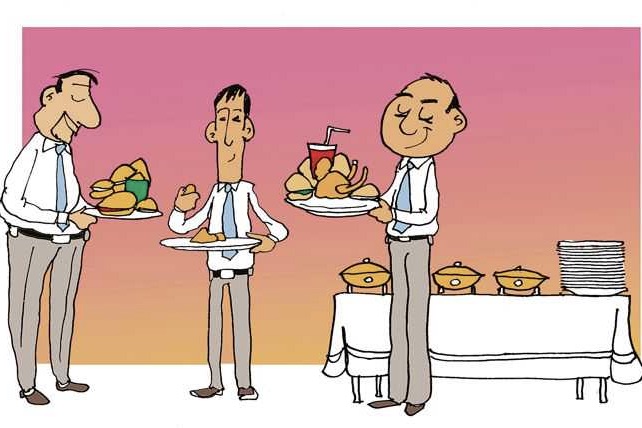
My son told me it’s called Google 15. The fifteen pounds that Nooglers supposedly gain from gorging on the omnipresent free food. Its said to take a year for new recruits to realise that the buffet won’t shrink but their midriff will expand !
When I had visited his office cafeteria, I was floored by the diverse multi cuisine menu, dutifully color coded according to their calorific value. Having always been a foodie, and with the space in my stomach at a premium, I struggled to decide what to eat and what to leave. The perfectly uncooked sushi or the perfectly cooked waffles, the crisp dosas or the oh-so-soft doughnuts, not to mention the expensive cheeses and exotic nuts lying around.
That is when he said it, while dispassionately eating his daily ration of six boiled eggs, sans yolk. He didn’t even glance at the ‘Day’s specials’ ! I looked around, there were a hundred other employees at various counters, all young, all fit, none overweight having their breakfast…..eating for subsistence …eating to live…not living to eat. By the G15 definition they seemed to be old employees, must have lost both interest and weight, after the initial gain.
I had heard that food is never more than a hundred feet away in a Google office and now I was experiencing it first hand. With the multitude of cafeterias, themed restaurants, snack bars, micro kitchens and refrigerators laden with beverages I was amazed that obesity was not an epidemic. Intrigued, I did some research and discovered that the fifteen pound weight gain is more of an insiders joke, an exaggeration. It seems that Google had done some research too. Concerned about unhealthy weight gain in their employees, a special ops force of behavioural science PhDs conducted surveys of snacking patterns, consulted academic papers on food psychology, and launched an experiment. They noted that if cookies were kept right beside the coffee machines many took them mindlessly while passing. Simply moving them a few meters away resulted in a calorie reduction that led to an annual loss of half a kilogram weight.
Many similar subtle changes were introduced. They started putting out smaller plates with suggestions that more food on the plate meant more food in the stomach. Dessert serving size was reduced to three spoons, just enough to cure a craving. They started keeping water at eye level and sweetened sodas in the lower shelves in refrigerators, positioned salad and fruit bars up front in the buffet, removed M&Ms and candies from transparent dispensers and hid them in opaque containers. In nutshell Google didn’t take away any unhealthy products. They simply moved them to less visible locations and their consumption dropped leading to weight loss.
One doesn’t have to be a google employee to benefit from this research. We make hundreds of choices every day and the majority are more or less automatic. No one has time to actively think through every little choice about mundane stuff, like what you should and shouldn’t eat. That is why planning is so important, it affects the unconscious decisions we make. By planning grocery shopping, food preparation and placement of food at home it will be easier to stick to healthy habits when we’re tired, hungry or stressed.
And now the million dollar, or perhaps, billion dollar question, the question you are dying to ask. Why do they do it? What does the company gain from indulging it’s employees so much? Well it seems to be a calculated move, not just for philanthropy and goodwill. Research shows that when food is provided on site, employees take shorter breaks. Similarly turning up for breakfast and staying late for dinner means longer office hours and hopefully more output. Most of all it ensures loyalty, people are less likely to leave an organisation that cares. Remember Sambha pleading, “ Sardar, maine aapka namak khaya hai” in Sholay. It seems Google got inspired.
( published in my column in the Tribune on 8/6/19)